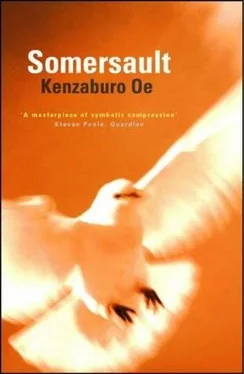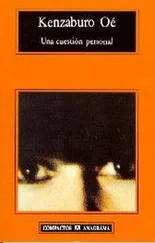"This is what I should have said to him: 'They explain my silence./ I wish there were as simple/ an explanation for the silence of God! That hits it right on the head."
Patron's dark glistening eyes were no longer aimed at Kizu but were fixed steadily on an invisible companion only he could see.
The mid-October sky was threatening rain, the gloomy road beginning to lighten in the approaching dawn, as they sped toward home, Ikuo at the wheel. Kizu, meanwhile, ruminated on what Patron had said regarding Thomas's poem and his accompanying translation. 'Younger I deemed truth/ was to come at beyond the horizon,' he mused. I think that's true. Isn't that why I set out for America? And what was the result? I ended up never re- ally investigating that truth.
Ikuo got out of the car for a moment. As Kizu opened the side door next to the main entrance with the same key he used for his apartment, he heard Ikuo's voice, almost apologetically, from behind.
'I wish I could come up to my room now, but Ogi and Dancer have this plan we need to work on."
Kizu turned around and nodded.
'Yesterday, after I drove you and went back to the office," Ikuo went on› Dancer told me that Patron would like you to donate something he needs, s°mething of great value. Did you talk about this? Religious leaders might Seem unworldly, but they have a practical side too, don't they?"
Kizu suspected that Ikuo and Dancer were behind this pronouncement of Patron's. But he merely nodded again, pushed open the solid American- type steel door, and went in alone.
This year Kizu sensed that the seasons were changing quickly. Even on days when the morning light shone into his room above the branches of the wych elm, the position of the light was changing, no longer reaching the spot where he sunbathed in the nude.
Kizu's sunbathing, his middle-aged-man's habit, wasn't something he wanted others to see. Ikuo might be living with him and modeling in the nude, but even if Kizu often lounged nude on the sofa he never invited Ikuo to join him. Not that there were many chances to do so, with Ikuo now so busy at the office.
When he was alone, Kizu spent his time painting and preparing his readings of R. S. Thomas for Patron. He reread his note-filled paperback copy of Thomas's poems, gathered books of Thomas's prose writings, and read the theses and monographs that young Welsh scholars had written, like good con- scientious sons. He faxed the assistant in his office back in the States a request to look for these books. Coincidentally, the assistant's father happened to be an immigrant from Wales, from Thomas's own parish, in fact. Though he wasn't an Anglican but a member of a minor denomination, her father re- membered seeing Thomas, a clergyman, walking through the fields wield- ing a walking stick like some kind of sports equipment. She added a note in the package of books saying how surprised she was to find that even the Japa- nese were reading Thomas's poetry.
At one of their late-night readings, Kizu quoted the following Thomas poem.
"I emerge from the mind's cave into the worse darkness outside, where things pass and the Lord is in none of them.
"I have heard the still, small voice and it was that of the bacteria demolishing my cosmos. I have lingered too long on "this threshold, but where can I go?
To look back is to lose the soul
I was leading upwards towards the light. To look forward? Ah, "what balance is needed at the edges of such an abyss.
I am alone on the surface of a turning planet. What"
Kizu and Patron always began with Kizu reading aloud from his paper- back copy, Patron following along in the hardbound copy in his lap. Kizu's translations served as reference. Then they would discuss the poem, stanza by stanza. On this particular day when Kizu had read to this point, Patron thought the poem ended there, an understandable mistake since the poems in the collected works edition he was using were almost all complete on one page.
"That's exactly right." He sighed in admiration. "Only someone who's desperate, driven into a corner, could write a poem like that."
This didn't sit well with Kizu, the longtime teacher.
"Thomas divides his stanzas in unusual ways," he cautioned his pupil.
"The last word in this stanza, 'What, ' is the first word in the next stanza, ac- tually. The meaning of the line doesn't end there."
Patron's response was unexpected.
"But the next stanza isn't really necessary, is it?" he said confidently.
"How did you translate the next line? What comes after 'What'?"
"to do but, like Michelangelo's Adam, put my hand out into unknown space, hoping for the reciprocating touch?"
"I see! But even though he triumphantly produced this smart stanza, if you look at the whole poem it's an unnecessary addition, don't you think?"
"Don't you believe at all in this kind of 'reciprocating touch'?" Kizu questioned him.
"These past ten years I've been in the dark," Patron said, "but I haven't relied on a reciprocating touch. I emerge from the mind's/ cave into the worse darkness/ outside, where things pass and/ the Lord is m none of them.' I've ex- perienced this more often than I can recall, but I never attempted to find God as I passed through there. Doesn't Thomas at times try to be overly suggestive?
"Do you really need to keep your balance on the edge of the abyss? When I made my noisy reversal in front of the media, falling even farther into the abyss, it was like a Ping-Pong ball trying to sink down by itself into a tub of water. Even without the last stanza-no, even with it-I agree that this is an outstanding poem."
Kizu felt a slight maliciousness from Patron as he smiled at him in the gloom. Trying to control his rising displeasure, Kizu took out a volume of Thomas's prose writings and showed the following to Patron.
The ability to be in hell is a spiritual prerogative, and proclaims the true nature of such a being. Without darkness, in the world we know, the light would go unprized; without evil, goodness would have no meaning. Over every poet's door is nailed Keats's saying about negative capability. Poetry is born of the tensions set up by the poet's ability to be "in uncertainties, mysteries, doubts, without any irritable reaching after fact and reason."
When he'd finished reading, Patron looked serious again.
"He's entirely correct," he said. "Thomas is a clergyman, but I think he says more telling things about poetry than about religion. In the final analy- sis, I should say, he's a poet."
Once more, Kizu felt he'd been given the slip. He said nothing. Com- pared to the craftiness of Patron, a man of about his own age, Kizu felt him- self rather naive.
Patron continued, trying to soothe Kizu. "Of course there's nothing of the poet about me, but I can sympathize with this particular one. This calm ability to be in hell and, as Keats puts it, the ability to be 'in uncertainties, mysteries, doubts, without any irritable reaching after fact and reason'-these would be wonderful mottoes for my old age!"
Under the light of the lamp stand, Patron's head jutted forward as he read, and Kizu could see saliva glistening on both sides of his dark cocoonlike lips. His voice had risen in pitch, and Dancer, sensing in this a sign of excite- ment and exhaustion, quickly and stealthily stepped to his side, gave him medicine directly from her hand, and held a glass of water to his lips. Patron gave himself up to Dancer's practiced movements. She then transferred the cup to her left hand and wiped the saliva away from Patron's lips with the back of her other hand.
It was morning again when Kizu went home, but this time, instead of Kizu's Mustang, Ikuo drove a minivan, a present from Kizu for Patron to use for meetings he planned to hold in sites outside Tokyo. Expecting that he would be attending these meetings, Ikuo was doing his best to get used to driving the van.
Читать дальше





